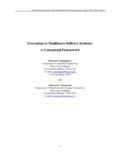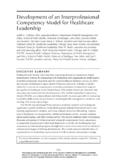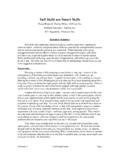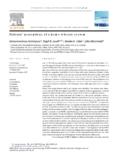Transcription of Health Policy and Systems Research - WHO
1 A Methodology ReaderHealth Policy and Systems ResearchEdited by Lucy GilsonA Methodology ReaderHealth Policy and Systems ResearchEdited by Lucy Gilson World Health Organization 2012 All rights reserved. Publications of the World Health Organization are available on the WHO web site () or can be purchased from WHO Press, World Health Organization, 20 Avenue Appia, 1211 Geneva 27, Switzerland (tel.: +41 22 791 3264; fax: +41 22 791 4857; e-mail: for permission to reproduce or translate WHO publications whether for sale or for noncommercial distribution should be addressed to WHO Press through the WHO web site ().The designations employed and the presentation of the material in this publication do not imply the expression of any opinion whatsoever on the part of the World Health Organization concerning the legal status of any country, territory, city or area or of its authorities, or concerning the delimitation of its frontiers or boundaries.)
2 Dotted lines on maps represent approximate border lines for which there may not yet be full mention of specific companies or of certain manufacturers products does not imply that they are endorsed or recommended by the World Health Organization in preference to others of a similar nature that are not mentioned. Errors and omissions excepted, the names of proprietary products are distinguished by initial capital reasonable precautions have been taken by the World Health Organization to verify the information contained in this publication. However, the published material is being distributed without warranty of any kind, either expressed or implied. The responsibility for the interpretation and use of the material lies with the reader. In no event shall the World Health Organization be liable for damages arising from its use. The named authors alone are responsible for the views expressed in this by the WHO Document Production Services, Geneva, SwitzerlandDesigned by Library Cataloguing-in-Publication DataHealth Policy and Systems Research : a methodology reader / edited by Lucy Policy .
3 Services Research . of Health care. literature. , Lucy. for Health Policy and Systems Research . Health 978 92 4 150313 6(NLM classification: W )ContentsContentsPart 1 About this Reader Introduction to Health Policy and Systems Research .. What is Health Policy and Systems Research ? ..21 Key characteristics ..21 Key areas of HPSR ..222. Health Systems ..23 Goals ..23 Elements and characteristics ..23 Multi-levels of operation ..24 Interactions and interrelationships ..253. Health system development or strengthening ..264. Health Policy ..285. Health Policy analysis ..28 Policy actors ..29 The focus and forms of Policy analysis ..296. The boundaries of HPSR ..30 What HPSR is ..31 What HPSR is not ..32 The distinction between HPSR and service delivery/disease programme Research ..32 Fuzzy boundaries ..337. Understanding the nature of social and political reality.
4 34 Positivism ..35 Relativism ..35 Critical realism ..36 HPSR perspectives on causality, generalizability and learning ..36 References ..38 Contents 5 Part 2 Part 3 Doing HPSR: Key steps in the processUnderstanding Health Policy and Systems ..41 Step 1: Identify the Research focus and questions ..43 Networking and creative thinking ..44 Literature search ..45 Key challenges ..46 Identifying the purpose of the Research ..47 Taking account of multidisciplinarity ..51 Finalizing Research questions ..51 Step 2: Design the study ..52 Using theory and conceptual frameworks to inform the study ..54 Step 3: Ensure Research quality and rigour ..55 Step 4: Apply ethical principles ..58 References .. system frameworks ..63 Bloom G, Standing H, Lloyd R (2008). Markets, information asymmetry and Health care: Towards new social contracts..63de Savigny D et al. (2009). Systems thinking: What it is and what it means for Health : de Savigny D, Adam T, eds.
5 Systems thinking for Health Systems strengthening..63 Conceptual frameworks for HPSR ..64 Atun R et al. (2010). Integration of targeted Health interventions into Health Systems : a conceptual framework for analysis..64 Bossert T (1998). Analyzing the decentralization of Health Systems in developing countries: decision space, innovation and performance..64 Brinkerhoff D (2004). Accountability and Health Systems : toward conceptual clarity and Policy relevance..64 Franco LM, Bennett S, Kanfer R (2002). Health sector reform and public sector Health worker motivation: a conceptual framework..64 Gilson L (2003). Trust and Health care as a social institution..64 Kutzin J (2001). A descriptive framework for country-level analysis of Health care financing arrangements..64 Vian T (2007). Review of corruption in the Health sector: theory, methods and interventions..64 Walt G, Gilson L (1994).
6 Reforming the Health sector in developing countries: the central role of Policy analysis..64 Gilson L, ed. (2012). Health Policy and Systems Research : A Methodology ReaderAlliance for Health Policy and Systems Research , World Health Organization6 Part 4 Empirical papers ..65 Overview: Research strategies and papers ..671. Cross-sectional perspectives ..72 Blaauw D et al. (2010). Policy interventions that attract nurses to rural areas: a multicountry discrete choice experiment..75 Glassman A et al. (1999). Political analysis of Health reform in the Dominican Republic..83 Morrow M et al. (2009) Pathways to malaria persistence in remote central Vietnam: a mixed-method study of Health care and the community..95 Ramanadhan et al. (2010). Network-based social capital and capacity-building programs: an example from Ethiopia ..105 Ranson MK, Jayaswal R, Mills AJ (2011).
7 Strategies for coping with the costs of inpatient care: a mixed methods study of urban and rural poor in Vadodara District, Gujarat, India..116 Riewpaiboon et al. (2005). Private obstetric practice in a public hospital: mythical trust in obstetric care..129 Rwashana AS, Williams DW, Neema S (2009). system dynamics approach to immunization healthcare issues in developing countries: a case study of Uganda..139 Sheikh K, Porter J (2010). Discursive gaps in the implementation of public Health Policy guidelines in India: The case of HIV testing..1522. The case study approach ..161 Atkinson S et al. (2000). Going down to local: incorporating social organisation and political culture into assessments of decentralised Health care..166 Mutemwa RI (2005). HMIS and decision-making in Zambia: re-thinking information solutions for district Health management in decentralised Health Systems .
8 184 Rolfe B et al. (2008). The crisis in human resources for Health care and the potential of a retired workforce: case study of the independent midwifery sector in Tanzania..197 Russell S, Gilson L (2006). Are Health services protecting the livelihoods of the urban poor in Sri Lanka? Findings from two low-income areas of Colombo..210 Shiffman J et al. (2004). The emergence of political priority for safe motherhood in Honduras..2233. The ethnographic lens ..235 Behague DT, Storeng KT (2008). Collapsing the vertical-horizontal divide: an ethnographic study of evidence-based policymaking in maternal Health ..239 Lewin S, Green J (2009). Ritual and the organisation of care in primary care clinics in Cape Town,South Africa..245 Murray S F, Elston MA (2005). The promotion of private Health insurance and its implications for the social organisation of Health care: a case study of private sector obstetric practice in Chile.
9 (Reproduced in the print version only)Aitken JM (1994). Voices from the inside: Managing district Health services in Nepal. (Reproduced in the print version only) George A (2009). By papers and pens, you can only do so much: views about accountability and human resource management from Indian government Health administrators and workers. (Reproduced in the print version only) Contents7 Part 4 (continued)4. Advances in impact evaluation ..253Bj rkman M, Svensson J (2009). Power to the people: evidence from a randomized field experiment on community-based monitoring in Uganda..257 Macinko J et al. (2007). Going to scale with community-based primary care: an analysis of the family Health programme and infant mortality in Brazil..292 Marchal B, Dedzo M, Kegels G (2010). A realist evaluation of the management of a well-performingregional hospital in Ghana..3035. Investigating Policy and system change over time.
10 317 Brown TM, Cueto M, Fee E (2006). The World Health Organization and the transition from international to global public Health ..320 Crichton J (2008). Changing fortunes: analysis of fluctuating Policy space for family planning in Kenya..331 Masanja H et al. (2008).Child survival gains in Tanzania: analysis of data from demographic and Health surveys..343 Van Ginneken N, Lewin S, Berridge S. (2010). The emergence of community Health worker programmes in the late apartheid era in South Africa: an historical analysis..3516. Cross-national analysis ..361 Bryce J et al. (2005). Programmatic pathways to child survival: results of a multi-country evaluation of Integrated Management of Childhood Illness..363 Gilson L et al. (2001). Strategies for promoting equity: experience with community financing in three African countries..369 Lee K et al. (1998). Family planning policies and programmes in eight low-income countries: A comparative Policy analysis.













